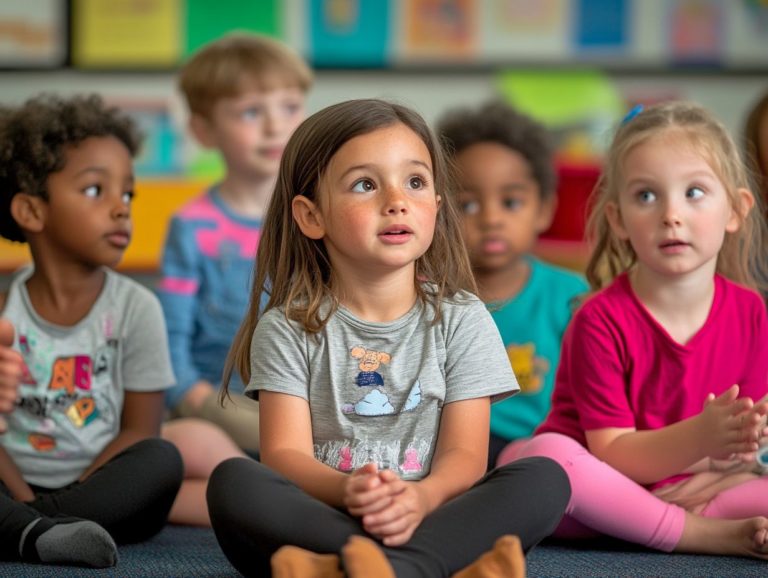Mindful Communication Techniques for Parents
Effective communication is crucial in your parenting journey, yet it often gets lost in the whirlwind of everyday life.
Mindful communication provides a transformative approach that deepens the connections between you and your children. By embracing essential principles like active listening, empathy, and authenticity, you can navigate challenges more gracefully and cultivate a nurturing environment.
This article delves into what mindful communication truly means, its importance for you as a parent, practical exercises to enhance these skills, and the significant benefits it brings to your family dynamics.
Discover how mindful communication can empower you to strengthen your relationships and tackle parenting challenges with confidence!
Contents
- Key Takeaways:
- What is Mindful Communication?
- Why is Mindful Communication Important for Parents?
- What are the Key Principles of Mindful Communication?
- 1. Active Listening
- 2. Non-Judgmental Attitude
- 3. Empathy
- What are the Benefits of Mindful Communication for Parents?
- Understanding Mindful Communication in Parenting
- How Can Mindful Communication Help in Parenting Challenges?
- 2. Managing Teenage Rebellion
- 3. Resolving Sibling Rivalry (with insights from experts like Daniel J. Siegel and Tina Payne Bryson)
- Frequently Asked Questions
- What are mindful communication techniques for parents?
- Why are mindful communication techniques important for parents?
- How can parents practice mindful communication?
- What are some benefits of using mindful communication techniques as a parent?
- Can mindful communication techniques be used with children of all ages?
- How can parents deal with difficult behaviors using mindful communication techniques?
Key Takeaways:

- Mindful communication is actively listening and responding without judgment, with empathy and authenticity as guiding principles.
- Practicing mindful communication can lead to improved parent-child relationships, reduced conflict, and better understanding of children’s needs.
- Mindful communication can also help parents effectively deal with common challenges such as tantrums, teenage rebellion, sibling rivalry, and communicating with co-parents.
What is Mindful Communication?
Mindful communication is all about engaging in conversations with a keen awareness of both verbal and non-verbal cues. This fosters genuine emotional understanding and connection. It underscores the necessity of being fully present during interactions, a key element for cultivating empathy and self-awareness.
This approach helps anyone improve their emotional regulation and communication skills, ensuring that their interactions are not only constructive but also supportive. By incorporating mindfulness techniques, you can greatly enhance your social skills and nurture deeper relationships, paving the way for a more compassionate and understanding environment.
Why is Mindful Communication Important for Parents?
For you as a parent, practicing mindful communication is essential for fostering stronger relationships with your children and navigating the complexities of parenting dynamics. This approach allows for emotional validation and is crucial for your children’s mental health and emotional development.
By engaging in effective communication, you can address any emotional struggles your children may be experiencing and respond to their emotional triggers with compassion and understanding. Mindful communication becomes a vital tool in enhancing your parenting skills, giving you the power to manage family law challenges and co-parenting conflicts with both ease and transparency.
What are the Key Principles of Mindful Communication?
The key principles of mindful communication serve as the bedrock for fostering effective and empathetic interactions. At the forefront is active listening, a practice that urges you to focus completely on the speaker, cultivating a non-judgmental attitude that creates a welcoming space for honest dialogue.
Empathy and authenticity are equally vital; they enable you to forge emotional connections that enhance constructive communication. Each of these principles significantly contributes to emotional regulation, elevating your personal interactions and ensuring a supportive environment for sharing thoughts and feelings.
1. Active Listening
Active listening is an essential aspect of mindful communication. It involves engaging fully with the speaker, demonstrating genuine interest and understanding. This practice requires your presence in the conversation, allowing you to effectively process and validate the speaker’s emotions.
By focusing on both verbal and non-verbal cues, active listening fosters a deeper emotional understanding and strengthens relationships. It establishes itself as a cornerstone of effective communication.
It includes techniques such as paraphrasing, where you restate what you ve heard to confirm your understanding. Another technique is reflecting emotions, which involves acknowledging the speaker’s feelings by saying things like, “It sounds like you felt really overwhelmed.” These approaches clarify the message and convey empathy, nurturing a sense of connection.
The advantages of active listening are profound. It can lead to improved trust, reduced conflicts, and enriched conversations.
Boost your understanding of emotions in your interactions to elevate overall relationship dynamics. This makes active listening critical in both personal and professional settings.
2. Non-Judgmental Attitude
Adopting a non-judgmental attitude in your communication is a powerful way to encourage openness and acceptance. It allows conversations to flow seamlessly, free from the fear of criticism or rejection. This principle is vital for fostering compassion and emotional regulation. It creates a safe space for you and others to express yourselves freely.
By practicing non-judgmental acceptance, you can engage in constructive communication that truly enhances understanding and strengthens relationships. This approach invites diverse perspectives, deepening connections and fostering harmonious dialogue.
For instance, when discussing differing opinions on sensitive topics, choose to listen actively instead of reacting defensively. Acknowledging the other person’s feelings without imposing your own judgments leads to a richer exchange of ideas.
Reflecting on the emotions being communicated can help you manage your responses more effectively. This not only leads to healthier conversations but also promotes empathy, cultivating a more compassionate environment where everyone feels valued and understood.
3. Empathy

Empathy is your ability to understand and share the feelings of another. It serves as a cornerstone of mindful communication and an essential element in building strong relationships. By actively engaging with the emotions of others, you enhance your emotional understanding and self-awareness, paving the way for more meaningful interactions.
Empathy plays a critical role in fostering mindfulness within relationships. It cultivates connection and compassion that lead to healthier communication dynamics.
When you engage in empathetic communication, you consciously listen not only to the words being said but also to the underlying emotions that accompany them. For example, when a friend shares their sadness, responding with validation such as, “I can see this is really hard for you,” encourages openness and deepens your connection.
This kind of dialogue uplifts the other person and enriches your own self-understanding, prompting reflection on your feelings and reactions.
These interactions can significantly reduce conflict. You and others are more likely to approach disagreements with curiosity and respect instead of defensiveness. Ultimately, this enriches your relationships and expands your emotional landscape, allowing for a more fulfilling and compassionate experience in your connections with others.
Start practicing these techniques today to enhance your communication skills and strengthen your relationships!
4. Authenticity
Authenticity in communication is all about being genuine and truthful in your interactions. This approach not only enhances your emotional regulation but also fosters trust between you and others. By embracing this principle, you can engage in transparent conversations where everyone feels free to express their thoughts and feelings without any pretense.
Adopting authenticity allows you to create a more engaging and supportive environment that encourages mindfulness techniques and constructive dialogue!
When you prioritize authenticity, you strengthen your relationships with others and contribute to a culture that values open expression. This openness paves the way for deeper connections and the nurturing of empathy, as both you and the other person feel safe to share without fear of judgment.
To cultivate authenticity in your conversations, focus on actively listening, validating others’ feelings, and sharing personal experiences that reflect your genuine emotions. Practicing mindfulness can further enhance your awareness of your feelings, leading to clearer communication.
By fostering an environment of trust, you ll find emotional regulation becomes much more manageable, resulting in healthier and more fulfilling interactions.
How Can Parents Practice Mindful Communication?
You can enhance your approach to mindful communication by seamlessly integrating various mindfulness practices into your daily interactions with your children. This holistic method not only deepens the bond between you and your child but also nurtures emotional validation, creating a supportive and understanding atmosphere at home.
By utilizing communication training resources, you can refine your skills, ensuring that you respond to your child’s needs and emotions with genuine empathy and compassion. Committing to this practice of mindful communication sets the foundation for healthier, more constructive relationships that will benefit both you and your child.
1. Mindful Listening Exercises
Mindful listening exercises are crafted to elevate your active listening skills, fostering richer emotional understanding and connection between you and your child. These exercises invite you to immerse yourself fully in your child s words, feelings, and needs, promoting effective communication methods that nurture trust and openness. With consistent practice, you will find that the quality of your interactions improves significantly, paving the way for more meaningful conversations!
Consider setting aside a few minutes each day for uninterrupted one-on-one time, where you can actively listen as your child shares their thoughts or experiences. Another technique is mirroring, where you repeat back what your child says, encouraging them to elaborate while showing that their perspective truly matters!
Such practices not only bolster your child’s confidence in expressing themselves but also deepen the bond you share. As children feel heard, their emotional vocabulary expands, allowing them to articulate their feelings more clearly. This, in turn, reinforces healthy communication patterns that will last a lifetime and promote emotional regulation.
2. Mindful Speaking Exercises
Engaging in mindful speaking exercises gives you the power to articulate your thoughts and feelings with both clarity and compassion, significantly enhancing your overall communication effectiveness. These exercises promote emotional validation, allowing you to express empathy and understanding in your interactions. By weaving mindfulness techniques into your speaking practices, you can cultivate a positive communication environment that fosters connection and minimizes conflict, enhancing your communication principles!
Practicing ‘active listening’ involves echoing back what your child has said before responding. This simple act demonstrates that you genuinely value their feelings. Another powerful approach is to use ‘I feel’ statements, which help you convey your emotions without laying blame.
By embracing these mindful speaking exercises, you not only affirm your child s emotions but also model constructive dialogue, paving the way for healthier interactions. Ultimately, these practices enhance emotional bonds and serve as essential tools for conflict resolution!
Incorporating mindfulness practices also aids in stress reduction, fostering a positive mood.
What are the Benefits of Mindful Communication for Parents?
Are you looking to improve your connection with your kids? Mindful communication can transform your parenting journey!
By practicing mindful parenting, you can enhance parent-child relationships and cultivate a deeper emotional connection within the family. These practices also improve social connectedness and overall mental health.
Engaging in mindful dialogue and embracing non-judgmental acceptance effectively reduces conflict and misunderstandings, paving the way for a more harmonious home environment.
Furthermore, employing effective communication strategies combined with transparent communication gives you the power to tackle co-parenting challenges with greater ease and transparency, ensuring that every family member feels valued and supported.
1. Improved Parent-Child Relationship

An improved parent-child relationship is one of the most significant benefits of practicing mindful communication. It helps kids feel understood and enhances connection.
Use effective communication techniques to build trust. This allows your children to express themselves freely. By integrating mindfulness practices into your interactions, you can navigate complex emotions and strengthen your bond with your children.
For instance, when your child feels upset after a disappointing day at school, take a moment to actively listen and acknowledge those feelings. Instead of jumping in with solutions or dismissing their worries, this mindful approach validates your child’s emotions and encourages open dialogue.
Utilizing techniques such as reflective listening or open-ended questions allows you to deepen the connection further, ensuring your child feels heard and understood. Ultimately, fostering such an environment creates a safe space where your children can develop confidence and emotional resilience.
Incorporating empathy training into your routine can further bolster these skills.
2. Reduced Conflict and Misunderstandings
Mindful communication greatly diminishes conflict and misunderstandings between you and your children, fostering a more harmonious family environment.
By honing your emotional regulation skills and employing effective communication strategies, you can approach challenging situations with clarity and empathy. This proactive method cultivates a culture of understanding and cooperation within your household.
For example, when your teenager voices frustration about academic pressures, listen actively instead of reacting defensively. This kind of emotional regulation gives you the power to maintain your composure, steering the conversation toward a more constructive outcome.
Establishing family meetings provides a valuable platform for open dialogue, where everyone can express their concerns and feelings in a safe space. By addressing issues openly, you eliminate misunderstandings, strengthen relationships, and nurture a supportive atmosphere that benefits every family member.
Start incorporating these techniques in your daily interactions to see a positive change in your family dynamic!
Understanding Mindful Communication in Parenting
3. Better Understanding of Children’s Needs
A deeper understanding of your child’s needs emerges from practicing mindful communication, allowing you to attune to their emotions and behaviors more effectively. By nurturing emotional awareness through mindfulness in your relationships, you can identify and address your child’s underlying needs with greater precision. This practice also promotes self-awareness in parenting.
This heightened awareness gives you the power to adopt parenting techniques that resonate with your child’s feelings and emotions. You will feel more capable as a parent.
For example, employing techniques such as active listening and empathetic responses creates a safe haven for your child to express their feelings without fear. When you genuinely acknowledge your child’s emotions without any judgment, you foster trust and strengthen your bond.
Incorporating mindfulness practices like deep breathing or guided visualization into your daily routine can assist both you and your child in regulating emotions, making it easier to navigate those tricky situations.
By embracing these approaches, you not only become more adept at recognizing your child’s emotional cues but also model healthy communication habits that contribute to a more harmonious family dynamic. Techniques like writing a forgiveness letter can also help in fostering self-compassion and emotional balance within the family.
How Can Mindful Communication Help in Parenting Challenges?
Mindful communication acts as an invaluable asset in tackling the myriad challenges of parenting, providing you with strategies for emotional regulation and effective behavioral responses. By fostering open and empathetic dialogue, you can adeptly navigate conflicts such as tantrums, teenage rebellion, and sibling rivalry. Resources like Verywell Mind and experts like Tiara Blain and Sabrina Romanoff offer excellent guidance on these techniques.
By employing thoughtful communication techniques, you create an environment that promotes understanding and resolution, ultimately fortifying the dynamics within your family.
1. Dealing with Tantrums and Meltdowns
Navigating tantrums and meltdowns can be quite the challenge for you as a parent. However, embracing mindful communication can arm you with effective strategies for addressing these emotional triggers. By incorporating mindfulness techniques, you can maintain a calm and centered demeanor, which allows you to validate your child s feelings during those tough moments. This approach is also recommended by mental health professionals.
This approach cultivates an understanding atmosphere that can help de-escalate situations and encourage emotional regulation.
One powerful technique you can adopt is active listening. This means giving your child your full attention and acknowledging their emotions without any judgment. You can practice this by reflecting back what your child expresses, which demonstrates empathy and makes them feel truly heard. This technique is a cornerstone of constructive communication.
Another valuable method is modeling deep breathing exercises. This simple practice can help both you and your child manage your emotions more effectively. Using straightforward language to articulate feelings is also crucial; it encourages your child to express themselves openly. Engaging in a gratitude journal, which can be as simple as writing down three things you re thankful for each day, can also help in recognizing and appreciating positive experiences.
Ultimately, weaving these mindful communication strategies into your parenting toolkit can foster a nurturing environment, making it easier for your child to navigate their emotional experiences. This approach also enhances your overall parenting skills and contributes to better mental health for the entire family.
By employing these techniques now, you can transform your parenting journey and create a closer bond with your child.
2. Managing Teenage Rebellion
Managing teenage rebellion can be a daunting task. Through mindful communication, you can navigate this challenging phase with finesse. By fostering emotional understanding and employing effective communication techniques, you can engage in meaningful conversations that address your teenager’s needs without escalating conflicts.
This approach can be your game changer for overcoming co-parenting challenges during a rebellious period. It ensures that both you and your partner remain aligned in your strategies. Experts like Bill Eddy and organizations such as the High-Conflict Institute provide valuable insights on managing these situations.
For example, adopting active listening allows you to genuinely hear your teenager s perspectives. This can diffuse tension and build trust. Using open-ended questions encourages them to express their thoughts and feelings freely, creating a dialogue rather than a confrontation.
It’s also essential for you and your co-parent to regularly check in with each other. This reinforces a united front when discussing boundaries, co-parenting challenges, and emotional triggers.
Demonstrating empathy helps acknowledge the emotional turmoil that often accompanies this developmental stage. This can foster cooperation, reduce resistance, and cultivate a healthier family dynamic.
3. Resolving Sibling Rivalry (with insights from experts like Daniel J. Siegel and Tina Payne Bryson)

Resolving sibling rivalry can indeed be a complex endeavor. However, with mindful communication, you possess the tools necessary to foster emotional understanding and help manage emotions among your children.
By implementing effective communication methods and emotional management, you can mediate conflicts, encouraging your siblings to express their feelings and perspectives openly. This proactive approach not only prevents escalation but also cultivates a supportive family dynamic.
To enhance this process, consider introducing techniques such as active listening. One sibling can paraphrase the other’s feelings before responding. This ensures that everyone feels heard and valued.
Setting aside regular family meetings creates a safe space for discussing grievances and collaboratively developing resolutions. Incorporating mindfulness techniques and parenting skills can further enhance this process.
Role-playing different scenarios can empower your children to understand each other s viewpoints more deeply. This promotes empathy and social skills. When you model calm communication during conflicts, you re providing your children with invaluable skills for managing emotions.
By establishing boundaries and encouraging positive dialogue, you can transform sibling rivalry into opportunities for growth and strengthened relationships.
4. Communicating with a Co-Parent (supported by professionals such as Bill Eddy and institutes like High-Conflict Institute)
Effective communication with your co-parent is essential for mastering the complexities of co-parenting. Adopting mindful communication techniques can significantly enhance your dialogue. By prioritizing emotional validation and understanding, you can cultivate a collaborative approach that truly benefits your children.
Mindfulness in your relationship allows you to handle conflicts constructively and navigate relationship dynamics. This ensures that both your voice and your co-parent’s are heard and respected throughout the process.
One powerful strategy to implement is active listening. This means engaging fully with your co-parent without interruptions, showing genuine interest in their feelings and perspectives. For example, when discussing a schedule change, instead of reacting defensively, take a moment to validate your co-parent’s concerns. Acknowledge their feelings and express your willingness to find a compromise.
Practicing mindful decision-making and understanding different communication styles can also be beneficial in these discussions. Using ‘I’ statements can be incredibly effective in avoiding blame and fostering empathy. Phrases like “I feel worried when…” open the door for genuine dialogue.
Such practices not only build trust between you and your co-parent but also create a safe space for your children. This allows them to express their emotions as they navigate their own experiences in this dynamic. Incorporating mindfulness practices and maintaining self-awareness in parenting can greatly enhance these interactions.
Frequently Asked Questions
Insights provided by experts such as Tiara Blain and Sabrina Romanoff.
What are mindful communication techniques for parents?
Mindful communication techniques for parents are strategies that help you communicate effectively and empathetically with your children. These techniques involve being present, non-judgmental, and aware of your thoughts and emotions while communicating with your children. They can also aid in better understanding and addressing children’s emotional challenges.
Why are mindful communication techniques important for parents?
Mindful communication techniques are a game-changer for parents! They help build strong and positive relationships with your children. These techniques promote effective communication, reduce conflicts, and enhance children’s emotional well-being.
Moreover, they support the development of social skills and emotional balance in children. Don’t miss out on the chance to strengthen your relationship with your child!
How can parents practice mindful communication?
Parents can practice mindful communication by actively listening to their children and being aware of their own emotions. Expressing yourself calmly and respectfully is crucial. Mindful breathing and body awareness exercises can also help you stay present and centered during conversations. Additionally, keeping a gratitude journal can foster a positive mood and enhance communication.
What are some benefits of using mindful communication techniques as a parent?
Some benefits of using mindful communication techniques include improved understanding between parent and child, increased empathy and emotional intelligence, and better conflict resolution skills. These techniques can also help you model healthy communication habits for your children, promoting social connectedness and relationship strengthening.
Can mindful communication techniques be used with children of all ages?
Yes, mindful communication techniques can be used with children of all ages. The techniques can be adapted to fit the developmental stage and individual needs of each child. For younger children, visual aids and simple language may be used, while older children may benefit from more in-depth discussions and guided reflections.
Engaging in empathy training and maintaining non-judgmental acceptance plays a key role in these practices. Start implementing these mindful techniques today for a deeper connection with your child!
How can parents deal with difficult behaviors using mindful communication techniques?
Mindful Communication Techniques
Parents can use mindful communication techniques to stay calm and listen without judgment. This approach helps children understand and regulate their emotions while collaborating on solutions.
Writing a forgiveness letter, which is a way to express feelings of forgiveness, and practicing self-compassion, or treating oneself kindly in moments of struggle, can also aid in managing challenging situations. These methods empower parents and children alike to navigate difficulties with understanding and care.






